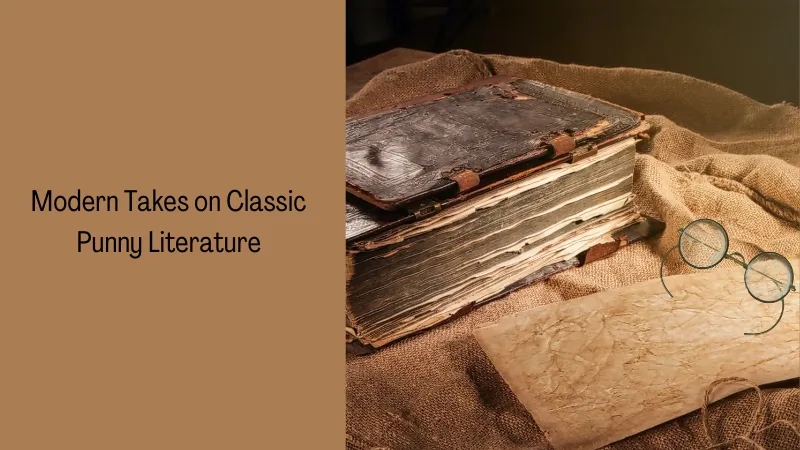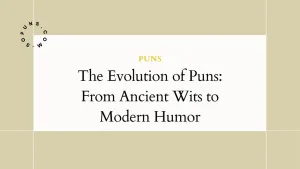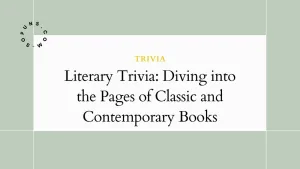For centuries, puns have played an integral yet overlooked role in some of history’s greatest literary achievements. Far from just silly wordplay, puns have allowed writers throughout the ages to squeeze extra meaning from each word and wink knowingly at readers. Delving into the punny underbelly of classic lit reveals added insight, humor, and subtext in the works of Shakespeare, Twain, Dickens, Joyce, and more.
The Bard’s Witty Wordplay
No writer worked a pun as deftly as the Bard himself, William Shakespeare. Throughout his plays and sonnets, Shakespeare crafted puns to convey a deeper meaning, make readers giggle, and reveal character personalities.
In Romeo and Juliet, the star-crossed lovers first meet at a party held by the Capulets. Romeo, a Montague, crashes the bash in disguise. Upon seeing Juliet, he asks her to “stand up” so he can kiss her. Juliet answers with the iconic line, “Then move not, while my prayer’s effect I take.” This response works on two levels: she’s telling Romeo not to leave while also inviting him to make his move. Shakespeare cleverly packed more intimacy and meaning into a short back-and-forth through this punny wordplay.
The Bard particularly loved a bawdy pun. In his play A Midsummer Night’s Dream, the character Bottom gets transformed into a donkey. But the dirty joke may pass over your head if you don’t notice that “bottom” was slang for “buttocks” in Shakespeare’s day. Suddenly Bottom’s donkey head takes on a whole new raunchy meaning!
Shakespeare also injected humor through puns in his most heart-wrenching tragedies. In Macbeth, the tortured title character laments, “Out, out brief candle!” as his murderous reign comes crashing down. The pun on “brief” meaning both short-lived and a candle wick gives added nuance to Macbeth’s famous soliloquy about the fleeting nature of life.
Punny Business from Twain & Dickens
Beyond Shakespeare, puns permeated the works of Charles Dickens and Mark Twain. Both authors used puns to reveal deeper truths as well as convey relatable humor.
In perhaps his most famous work, Adventures of Huckleberry Finn, Mark Twain packed plenty of puns. A favorite zinger comes after Huck fakes his own murder and hides out on Jackson’s Island. When Huck’s friend Tom Sawyer shows up for his funeral and finds him alive, Huck says, “I ain’t dead…I was ever so glad to see you. I warn’t ever so glad to see anybody before.” Tom replies, “And Huck, ain’t you glad I’ve come to shed some light on this funeral?” Twain’s pun on “funeral” and “light” pokes fun at the gloomy nature of wakes while underlining Tom’s ability to make any situation more exciting.
Meanwhile, Charles Dickens loaded his novels with puns that often revealed deeper social commentary. In Oliver Twist, the greedy villain Fagin has trained orphan boys to be expert pickpockets. When the Artful Dodger introduces Oliver to Fagin’s gang, Fagin says, “We are so fond of you that even Hideous will come out handsomely.” On the surface, it’s a silly compliment about how fond of Oliver they are. But the pun subtly highlights the boys’ grim fate – a life of turning the ugly business of pickpocketing into something more respectable.
Joyce’s Ulyssean Wordplay
No author worked harder at turning puns into high art than James Joyce in his modernist epic Ulysses. Throughout the complex novel, Joyce plays with language to capture the consciousness of ordinary Dubliners. He unpacked double meanings from everyday phrases that readers would recognize.
For example, Joyce wrote one passage from the perspective of two Irish women gossiping about a public scandal. Joyce recorded their chatter: “He had his answer ready for everything. Landlord, says he, I have been a reddener in your house for six and thirty years and I have never whitened so much as a latch and do you know that I am gone to the court for slander…”
To the uninitiated, that passage may seem confusing. But Joyce is playing with the phrases “red-handed” and “whitewashing” to pun about accusation and denial around the scandal. By twisting common expressions, Joyce invented a language readers intuitively understand – the language of puns.
Joyce even titled his chapters in Ulysses with literary puns. The chapter “Nausikaa” seems like an exotic name until you realize it puns on Homer’s Odyssey and the Irish word “náus”, meaning nausea. Joyce wanted to evoke Odysseus’ challenge of resisting the allure of the sirens and foreshadow the queasy feeling in that section of flirtation gone awry. Now that’s punny!
Satirical Puns in Candide
While Joyce punned to capture realism, the Enlightenment writer Voltaire used puns for purposeful satire. In his novella Candide, Voltaire tells the farcical tale of an ejected scholar to skewer the philosophy of Optimism.
Throughout Candide, Voltaire peppers puns to underline the absurdity of always believing “this is the best of all possible worlds.” When the hero Candide wanders after getting kicked out of a castle, for example, he meets a rag-tag group of vagabonds. One of them is missing an arm and a leg. Introducing himself as the math tutor of the baron’s son, he tells Candide, “You see in me one example of how the baron’s lessons were best learned.”
Voltaire’s dark pun on “learned” and “lost” satirizes the horrors that optimism glosses over. No wonder Candide soon abandons the theory as he confronts real human suffering!

Modern Takes on Classic Punny Literature
Contemporary writers still unpack and riff on puns from centuries-old literature today. The deeper insights and humor packed into lines like Shakespeare’s “brief candle” or Joyce’s “náus” keep inspiring new creative works.
For example, the title of Aldous Huxley’s classic sci-fi novel Brave New World originated from a pun in Shakespeare’s The Tempest. The character Miranda observes the shipwrecked men and says “Oh brave new world that has such people in it.” Huxley’s title twists the irony in Miranda’s pun on “new world” and “naive” to introduce his novel’s theme of a dystopian future.
Meanwhile, writers like Jonathan Swift, Margaret Atwood, and Helen Fielding borrowed Joyce’s example and loaded their satirical novels with punny wordplay and everyday speech. Their punny passages made complex ideas more accessible to ordinary readers through layers of meaning in simple language.
Why Do Literary Puns Matter?

Some may dismiss puns in classic literature as frivolous wordplay. But a closer look reveals how puns convey deeper meaning. As we’ve seen, puns have allowed iconic writers throughout history to:
- Make readers laugh and use humor to reveal the truth
- Add additional meaning and insight
- Capture authentic voices and everyday speech
- Enable satire and social commentary
- Inspire future creative works through inventive language
In many ways, puns fuse high and low culture. They link our most esteemed authors Shakespeare and Joyce with the silly Dad jokes and verbal wordplay we all use daily. Literary puns remind us language is creative, communal, and ever-evolving. The greatest writers pack worlds of meaning into each word. Uncovering their punny sides simply gives us another angle to admire their genius.
So next time you crack open a classic, keep your eyes peeled for puns. Just a simple twist of phrase could reveal so much more meaning. In the hands of our greatest authors, a pun contains multitudes.
FAQ
Here are answers to some frequently asked questions about literary puns:
Why did writers use puns more in classic literature than in modern books?
Some theories suggest puns and wordplay featured more heavily in classic works because oral tradition remained stronger when they wrote. Also, puns helped writers display wit and verbal dexterity in the days before special effects.
Do puns translate well from English into other languages?
Puns often exploit quirks of a particular language, so some literary puns are challenging to translate. But talented translators aim to replace the original pun with one that works in their own tongue while preserving meaning.
Were Shakespeare’s puns meant to be funny or meaningful?
Shakespeare used puns brilliantly for both humor and layered meaning. But even his silly puns tend to reveal deeper truths about characters, like the “bottom” donkey joke exposing wild behavior at the play’s wedding celebration.
Did authors like Joyce and Twain intentionally pack puns and wordplay into their writing?
Both Joyce and Twain had a meticulous, perfectionistic approach to language. So while some puns flowed naturally from their love of verbal play, they also labored over texts to sprinkle in clever turns of phrase and double meanings.
Are puns just a shallow, silly distraction in great literature?
Not at all! Many respected authors turned to puns purposefully to engage audiences. Rather than a cheap trick, puns can reflect mastery over language. When used skillfully, they add whimsy, insight and subtext to great works.
Conclusion
In closing, a deeper dive into puns adds a new dimension to appreciating classic literature. We discover how the likes of Shakespeare and Joyce harnessed the power of puns for humor and meaning. Even on the sentence level, these writers chose words with care to suggest multiple interpretations. Far from clumsy or low-brow, literary puns represent language at its most inventive and expressive. Unpacking punny wordplay offers another avenue to explore why these works still speak to us centuries later. They contain endless mysteries that keep delighting us upon each re-reading.
So next time you get trapped in a bad pun, think of it as continuing a legacy that connects you to the greatest wordsmiths of all time. After all, who doesn’t love being in good company?






No Comments